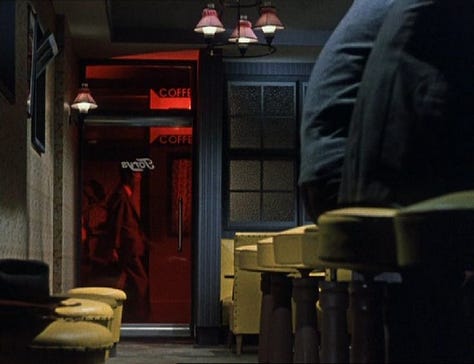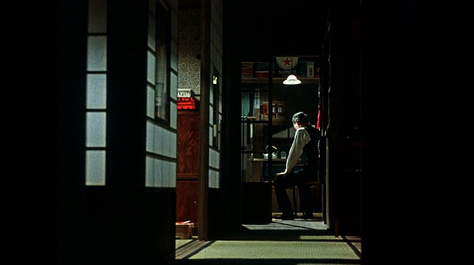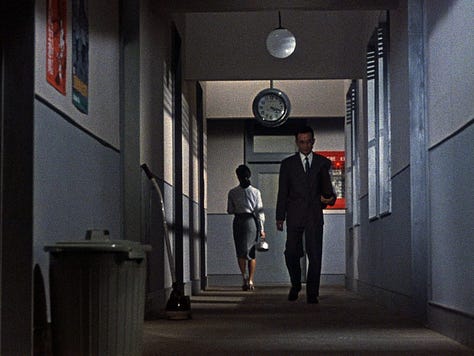This Could Have Been a Cloud Kitchen
Reviewing Yasujiro Ozu's Autumn Afternoon and season three of The Bear
Welcome to Summer Lightning, a weekly newsletter.. sometimes about how I watch too much TV.
Read about why stories involving fish are often tragic
Or about how Denver reminds me of a Bosch painting
I enjoyed the first two seasons of The Bear - less because of the storytelling and more because I was a single man in his early 30s who was estranged from his parents (Bear just like me fr). The first two seasons were less primetime TV and more of a really long, fast-tempo ambient track. It was quite easy to channel the high-tempo despair aesthetic of the show into writing a long email or lifting weights. Carmy is a more socialized, less violent version of Travis Bickle or Tyler Durden. I could hypothesize that the whole high concept pitch of the show was, "What if you asked a large language model to listen to the Trent Reznor Social Network soundtrack and create visuals that fit the mood," and honestly, it worked for a while. But I'm not single anymore, I love my girlfriend very much, and season 3 of The Bear is terrible.
Season one's arc followed Carmy returning to Chicago and attempting to revive his dead brother's restaurant. Season two followed the construction and opening of the new restaurant. Season three hinges on the ridiculous premise that the entire fortune of a new restaurant in 2024 hinges on a single review by a mainstream newspaper. I haven't been to Chicago in a while, but based on the show, I assume it's some backward land that does not have high-speed internet or Google reviews, or TikTok. I like the show so much that I would have been willing to suspend my belief, but the new season manages to have such anachronistic details while also being a catalog of every hypermodern mental malaise known to Western mankind. The Bear timeline has no network effects or other little luxuries afforded by the internet, and everyone is mentally unwell. Season three of The Bear is speculative fiction about how miserable life would have been without the little conveniences of the internet. You have all the same mental illnesses that you have now, but on top of that, you can't Amazon Prime deliver toothpaste (all the suffering that Amazon entails is still valid in The Bear) - this is life in Bear world.
The earlier seasons of the show attempted to invent a new genre—something that took the slow, meditative quality of the works of Yasujiro Ozu, Wim Wenders, et al. and injected it with the tempo of a 15-second TikTok clip. It was the Americanization of a genre that has been around for a while—something American filmmakers have been good at for a long time (only snobby people say that British Alfred Hitchcock is better than American Alfred Hitchcock).
In Ozu's Autumn Afternoon, a middle-aged widower is prompted by his friends and acquaintances to get his only daughter married before she becomes "too old." The movie tracks the man and his daughter subtly coming to terms with why they are reluctant to the central proposition. The daughter worries that the father will be left to fend for himself once she has moved. The father recognizes that he may feel really lonely once the daughter gets married and leaves. The story unravels through a lot of dialogue, and the scenes are often set in restaurants or dining tables. Ironically, Autumn Afternoon has a lot more eating and drinking than the show about restaurants and the price of being great. The movie also reflects the life of the creator in the same way that I like to presume that The Bear does. Ozu never married. He lived for 60 years with his mother, and when she died, he was dead a few months later. However, unlike The Bear, Ozu approaches his heavy subject matter with an air of lightness and distance. As a viewer, you don't feel sorry for the characters or anxious about what might happen to them in the future. The shots in Autumn Afternoon are often framed through doorways in a way that makes you feel like an outsider, observing a crucial narrative in a person's life gradually unfold. Watching an Ozu film requires patience, but the payoff is that it sticks with you for a long time.



The Bear, in the vein of Ozu, attempts to do the unraveling of a story through dialogue. It attempts to spin a narrative out of the day-to-day of high-end restaurant entrepreneurship. The problem is that the show underestimates and demands very little of its audience. It's made under the assumption that people only have the capacity for TikTok videos and, because of this, glosses over any possibility of an interesting narrative. For example, in season three, Sydney gets a new job offer that is competitive and in a more relaxed environment, but she is conflicted - we are not really shown why but are left to assume it is because she is learning to become "great" from Carmy. She has to suffer to be great, according to the ideology of Carmy (and the show?). In the final episode, Sydney talks about growing up as an only child and how it was nurturing and gentle, contrary to popular notions. The character she is talking to replies," ..perhaps that shows there is another way, that it does not have to be so hard." This is the crux of Sydney's arc, the moment her character has come full circle, what Matthew Dicks calls the five-second moment of the story, but you might have missed the whole thing in The Bear because of the show's obsessive close-ups of people having mental breakdowns and panic attacks. The show sacrifices a good story-worthy moment to navel-gaze on stylistically shot mental illness.
There are several potentially good story moments lurking in The Bear but it seems like the the prompt to the creators was to make a show that is the equivalent of a mental illness TikTok. Everyone in the show is having a mental breakdown every five minutes and it seems like that is the only thing that is going on in their lives. This broadcast is occasionally interspersed with a shot of Carmy expertly cleaning the floor or people delicately placing a garnish on top of a dish.
May be I should give the show the benefit of the doubt. I don't know, maybe The Bear knows what it is doing - perhaps it appeals to a certain kind of person who tends to make mood boards about being mentally ill. The show definitely makes me admire the mediocre shows that have been going on consistently for several years. If anything, someone should make a show about restaurants (clearly, there is demand) that is the complete opposite of The Bear. Perhaps a sitcom where a bunch of characters deliberate whether to turn their local rundown sandwich shop into a Michelin star-worthy spot. Ultimately they decide to become a cloud kitchen for Doordash. Hilarity ensues.


